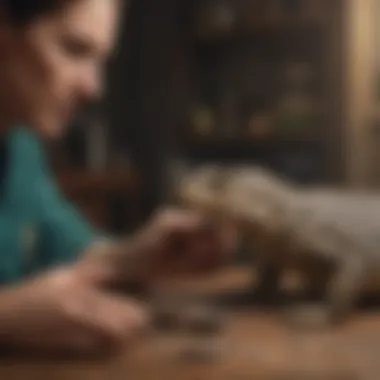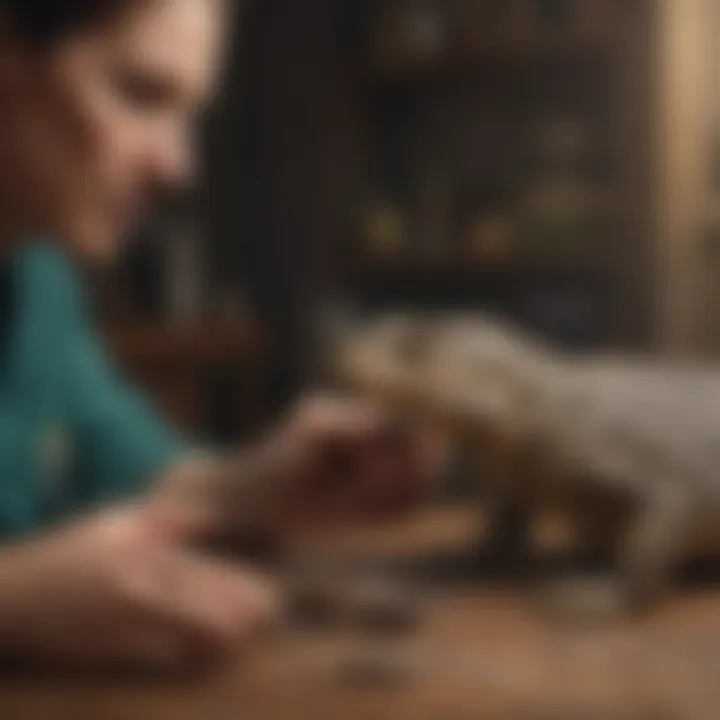Understanding the Essential Role of Exotic Pet Veterinarians


Intro
The specialization of exotic pet veterinarians is an essential topic for pet owners, prospective adopters, and animal enthusiasts. Most people know about traditional pets like dogs and cats. However, exotic pets, such as reptiles, birds, and small mammals, require distinct care. Thus, understanding the role of veterinarians in this field is vital.
Exotic pet veterinarians not only have unique medical skills but also knowledge about different species' behavior and biology. The health and well-being of these non-traditional companions depend on specialized veterinary care. This article will explore their challenges and skills. It will also provide tips for pet owners in finding the right veterinarian for their exotic companions.
Understanding Your Pet
Understanding the specific needs of exotic pets is crucial for ensuring their health. Each species has unique traits, temperaments, and special requirements that must be addressed by their caregivers and veterinarians alike.
Breed Traits
Different exotic species come with varying characteristics. For example, reptiles have scales and specific temperature needs. Birds may require a comfortable environment that allows for social interaction. Each breed also has distinct life spans, typical sizes, and habitat needs. This knowledge assists owners in creating optimal living conditions for their pets.
Common Temperaments
Exotic pets can have widely differing temperamental profiles. Parrots are known for their sociability, while some reptiles may prefer solitude. Understanding these common temperaments helps owners engage with their pets more effectively. Owners can thus manage expectations about handling and bonding, ensuring a more harmonious relationship.
Special Needs
Each exotic pet may have different special needs. For instance, certain reptiles require UV lighting for proper health, while many birds need to chew to maintain beak health. Identifying these needs helps in providing better care and understanding when to seek veterinary assistance.
Pet Care Essentials
Caring for an exotic pet involves specific guidelines, particularly concerning nutrition, grooming, and overall health.
Nutrition and Feeding Guidelines
Proper nutrition is vital for the health of exotic pets. Owners must understand what their pets need to thrive.
- Reptiles may have a diet consisting of vegetables, insects, or specialized pellets.
- Birds often need seeds, pellets, and occasional fruits and vegetables. Each species has dietary requirements that should be addressed to avoid malnutrition.
Grooming Tips and Techniques
Grooming is as necessary for exotic pets as it is for traditional pets. For birds, regular nail trimming and bath opportunities can support cleanliness. For rabbits, brushing can help prevent matting and hairballs. Grooming practices differ but are critical for health and comfort.
Health and Wellness
Monitoring health is crucial. Routine check-ups with an exotic pet veterinarian can catch issues early. Owners should learn how to recognize signs of sickness in their pets, such as weight loss or changes in behavior. Regular health screening ensures that pets stay in optimal condition.
Training and Behavior
Training and behavioral observation are significant aspects of caring for exotic pets, just as with traditional ones.
Basic Training Techniques
Basic training can enhance the bond between owner and pet. Many dogs learn commands easily, but birds can also learn tricks. Positive reinforcement techniques often work best, regardless of the species.
Behavioral Problems and Solutions
Understanding common behavioral problems is essential. For example, parrots may exhibit biting when scared. Identifying triggers and providing a safe environment can help manage these behaviors and promote a peaceful home.
Mental Stimulation Activities
Providing mental engagement is critical. Exotic pets thrive when challenged. Puzzle toys, interactive feeders, and training sessions can keep their minds active.
Engaging with Your Pet
Engaging with exotic pets in a safe way enriches their lives and strengthens bonds with owners.
Interactive Games and Toys
Toys play an important role in maintaining the well-being of exotic pets. Items suited to their specific instincts can entertain them. Birds may enjoy shreddable materials, while small mammals like tunnels for hiding.
Safe Outdoor Activities
Outdoor activities can benefit the mental health of exotic pets. However, caution is necessary. Supervised exploration can provide stimulation, but creatures like reptiles are sensitive to extreme temperatures. Owners must plan appropriately.
Family-Friendly Pet Interactions
Educating family members on how to interact with exotic pets can ensure safety for both pet and human. Healthy boundaries and understanding can make for positive experiences, fostering respect and care.
Pet Adoption and Integration
When considering the adoption of an exotic pet, one must assess compatibility with their lifestyle. Proper preparation can lead to fulfilling relationships between pets and owners.


Choosing the Right Pet for Your Lifestyle
Several factors must be considered in pet choice. Time commitment, space, and species-specific needs should guide decisions. Doing thorough research on potential pets can lead to better outcomes.
Preparing Your Home for a New Pet
Before bringing a new pet home, ensure the environment is safe and welcoming. This includes creating the right habitat, securing hazardous items, and providing necessary equipment. Proper preparation can help smooth the transition.
Tips for Smooth Prelims
Introductions should be deliberate and gradual. Giving pets time to adjust can reduce stress. For example, isolating a new pet initially can permit gradual acclimatization.
By understanding the specialization of exotic pet veterinarians, owners can make informed decisions about the care and well-being of their non-traditional companions.
Prologue to Exotic Pet Veterinary Care
Exotic pets are becoming increasingly popular among pet owners. These unique companions require specialized care from veterinarians trained specifically for their needs. Understanding the intricacies of exotic pet veterinary care is essential for any owner considering such animals. The responsibilities of these veterinarians go beyond conventional care. They must navigate various challenges that stem from the distinct biology and behavior of diverse species.
Definition of Exotic Pets
Exotic pets encompass a wide range of species that differ from typical household companions like dogs and cats. This category includes birds, reptiles, amphibians, small mammals, fish, and even invertebrates. Each species varies significantly in terms of habitat, dietary requirements, and health care needs.
For instance, while a parrot may thrive on fresh fruits and seeds, a reptile like a leopard gecko requires a diet that includes live insects. The understanding of what constitutes an exotic pet is crucial for both veterinarians and owners. It informs the types of veterinary practices and principles that apply to these animals. Exposure to diverse pet species is a hallmark of modern veterinary practice, emphasizing the need for specialized training.
The Importance of Specialized Care
Specialized veterinary care for exotic pets is vital for several reasons. First, many exotic species have unique physiological functions, making them prone to specific health issues. Traditional veterinarians may not have the comprehensive knowledge required to diagnose or treat these conditions effectively.
Furthermore, proper husbandry and care protocols differ significantly from traditional pets. For instance, a turtle in captivity has different needs compared to a pet cat, including access to UV light and specific temperature regulations. These requirements highlight the necessity of expertise in exotic animal care.
Moreover, certain exotic species exhibit behavioral traits not commonly seen in domestic animals. A veterinarian must not only understand the medical needs but also the behavioral aspects of treating these animals. This specialized knowledge can lead to better health outcomes.
Overall, the role of exotic pet veterinarians is crucial for the health and well-being of these unique animals. Owners must prioritize finding such specialists to provide the best care possible for their exotic companions.
Types of Exotic Pets and Their Medical Needs
Understanding the various types of exotic pets and their medical needs is essential for any potential and current owner. Each kind of exotic pet has unique health requirements that differ significantly from traditional pets, such as dogs and cats. This section breaks down these variances, shedding light on the specific care protocols that come into play. Knowing the medical needs of your exotic pet not only ensures their wellbeing but also enhances the bond between pet and owner.
Birds as Exotic Pets
Birds, including parrots, canaries, and finches, have distinct health requirements. They need appropriate environments, diet, and veterinary care to thrive. Common health issues in birds can include respiratory problems, nutritional deficiencies, and behavioral issues. Regular check-ups can help detect early signs of illness. Birds are susceptible to stress, and even minor changes in their environment can affect their health.
- Diet: Birds require a balanced diet consisting of pellets, seeds, fruits, and vegetables. Malnutrition can lead to obesity or other serious health complications.
- Social Needs: They are social creatures; lacking interaction can lead to mental health issues, such as feather plucking.
Reptiles and Amphibians
Reptiles and amphibians bring their own set of medical considerations. Species like iguanas, snakes, and frogs have specific habitat needs, including humidity, temperature, and lighting. Failure to meet these requirements can lead to conditions like metabolic bone disease.
- Specialized Diet: Nutritional needs vary widely among species. Some reptiles need a diet of insects, while others require plants or specially formulated foods.
- Hygiene and Habitat: Regular habitat cleaning is crucial to prevent diseases. Only a qualified veterinarian can diagnose and treat conditions common among these pets.
Small Mammals
Small mammals such as guinea pigs, hamsters, and rabbits require careful monitoring of their health. They are prone to dental issues and specific dietary problems. Regular vet visits are critical as many dental diseases can be quite common among them.
- Dietary Needs: Their diet should consist of hay, pellets, and fresh greens. An improper diet can lead to obesity and various health diseases.
- Social Interaction: These pets thrive on companionship. A lack of social stimulation can lead to behavioral problems.
Fish and Aquatic Species
Fish and other aquatic creatures have unique needs, primarily revolving around water quality and diet. Aquarists need to monitor pH levels, temperature, and filtration systems closely. Even small shifts in these elements can be detrimental.
- Disease Prevention: Common issues can include ich, fin rot, and bacterial infections. Regular water changes and disease observation are key factors in maintaining a healthy aquarium.
- Nutrition: Different species may need specific food types, such as flakes, pellets, or freeze-dried options. Proper feeding helps prevent malnutrition and disease.
Exotic Invertebrates
Exotic invertebrates like tarantulas, scorpions, and various types of snails have needs that are often overlooked. They may require specialized environments in terms of humidity, temperature, and substrate.
- Habitat and Care: These creatures often need specific substrate material to mimic their natural habitat. A proper setup can reduce stress and health issues.
- Feeding: Depending on the species, they can be herbivores or carnivores, thus their diet must be well understood.
Understanding the unique needs of each type of exotic pet is essential for their health and longevity. Pet owners must be proactive in seeking specialized veterinary care to ensure their pets thrive.
Qualifications and Training of Exotic Pet Vets
The realm of exotic pet veterinary care is complex and specialized. This makes the qualifications and training of veterinarians in this niche particularly crucial. As exotic pets encompass a broad range of non-traditional species, their medical care requires unique knowledge and skills. A solid educational foundation, hands-on experience, and continued learning are vital for any veterinarian aiming to excel in this field.
Educational Requirements
To become an exotic pet veterinarian, a doctor of veterinary medicine (DVM) degree is essential. This typically involves four years of undergraduate study followed by four years in veterinary school. Courses often cover anatomy, physiology, pharmacology, and pathology, providing a broad medical understanding. However, during their training, aspiring veterinarians should focus on specialized programs that include exotic animal coursework. Some veterinary schools offer electives in exotic species, providing early exposure to animals like reptiles, birds, and small mammals.


Furthermore, hands-on experience is vital. Many universities have teaching hospitals where students can gain practical skills. Internships or externships focusing on exotic species can profoundly enhance their knowledge and proficiency. Such experiences are not just beneficial; they are often crucial in preparing a veterinarian for real-world challenges they will face in practice.
Board Certification Options
Obtaining board certification is another important step for exotic pet veterinarians. The American Board of Veterinary Practitioners (ABVP) offers a specialty in avian and exotic pet practice. This credential signifies that a veterinarian has reached a specific standard of excellence through rigorous examination. Beyond the ABVP, the American College of Veterinary Emergency and Critical Care also provides certifications pertinent to exotic care. These board certifications validate the veterinarian's expertise and commitment to ongoing professional development.
Veterinarians who achieve board certification can stand out in a competitive field. It reassures pet owners that their exotic companions are receiving care from highly qualified professionals.
Continuing Education and Specialization
The veterinary field is constantly evolving. New techniques, treatment protocols, and insights about various species emerge regularly. Thus, continuing education is not just recommended; it is a requirement in maintaining licensure in many areas. For exotic pet veterinarians, staying updated on issues like nutritional advancements, behavioral science, and disease outbreaks is crucial for optimal care.
Many veterinarians pursue additional courses, workshops, and conferences specifically geared toward exotic animals. Participation in continuing education helps enhance skills and knowledge. By being informed of the latest research and best practices, veterinarians can better advocate for and treat exotic pets.
“Veterinary medicine is a commitment to lifelong learning. For those caring for exotic pets, this dedication is even more imperative due to the unique challenges posed by these animals.”
Common Health Issues in Exotic Pets
Common health issues in exotic pets need special attention. These issues often arise from the unique physiology and behavior of each species. Understanding these health problems allows pet owners to take preventive measures and seek timely veterinary care. It is important to be aware of the specific challenges exotic pets face, as this knowledge directly impacts their overall well-being. By addressing common health issues, pet owners can enhance the quality of life for their animals, ensuring they remain healthy and active companions.
Nutritional Deficiencies
Nutritional deficiencies can have serious consequences for exotic pets. Each species has distinct dietary requirements that must be met to maintain health. For example, some reptiles require specific calcium to phosphorus ratios. A deficiency in these nutrients can lead to metabolic bone disease, a painful condition affecting their bones and overall health.
Birds may need a varied diet including seeds, fruits, and vegetables. Without proper nutrition, they can develop deficiencies leading to feather plucking or other behavioral issues. Small mammals, like guinea pigs, require vitamin C to prevent scurvy. A lack of this essential nutrient can result in serious health problems.
Pet owners should consult with exotic pet veterinarians to get tailored dietary advice. Regular health check-ups can also identify any deficiencies early on.
Respiratory Infections
Respiratory infections are common among exotic pets, especially birds and reptiles. These infections can be caused by various factors like poor husbandry, exposure to stress, or environmental pollutants. Birds, for instance, are particularly susceptible to respiratory issues due to their unique respiratory systems.
Signs of respiratory infections include coughing, nasal discharge, and difficulty breathing. If left untreated, these infections can become severe and even life-threatening. It is crucial for pet owners to provide a clean and stress-free environment. Regular veterinary check-ups can help in the early detection of any signs of illness and proper treatment.
Skin Disorders
Skin disorders in exotic pets can arise from several causes, including allergies, parasites, or underlying health problems. Reptiles, for instance, may experience shedding issues if humidity levels are inadequate. Birds may suffer from feather cysts or infections that require immediate attention.
Visible signs of skin disorders include itching, redness, or unusual growths. Skin health is an important indicator of overall health, so changes should not be overlooked. Proper hygiene and regular vet visits can help to maintain skin health. Owners should also be educated about species-specific skin conditions to provide appropriate care.
Parasite Infestations
Parasite infestations are another serious health issue for exotic pets. These can be both external, such as mites and fleas, or internal, such as worms. Parasites can cause a range of health problems, from weight loss to more severe conditions if not addressed promptly.
Prevention is key. Exotic pet owners must ensure that their pets are in a clean environment and receive regular check-ups. Exotic pet veterinarians can recommend appropriate preventive treatments and medications. Early detection and treatment are essential to manage and eliminate these infestations effectively.
Regular veterinary check-ups are essential in ensuring the health of exotic pets. Proper care can prevent many common health issues from developing.
Finding an Exotic Pet Veterinarian
Finding a qualified exotic pet veterinarian is a critical task for pet owners who have animals outside of the conventional cat or dog spectrum. Specialized care is essential for ensuring the well-being of exotic pets, which often have very different health needs compared to traditional pets. This section will highlight the importance of finding the right veterinarian, emphasizing key considerations such as qualifications, experience, and accessibility.
Evaluating Qualifications
When searching for an exotic pet veterinarian, evaluating qualifications should be one of the first steps. It is crucial to ensure that the veterinarian has the appropriate education and specialized training in exotic animal medicine. Many veterinarians may hold a general veterinary degree, but only a select few pursue further specialization in exotic animals. This can be indicated by certifications from recognized bodies, such as the American Board of Veterinary Practitioners.
Some common qualifications to look for include:
- Doctor of Veterinary Medicine (DVM) or equivalent
- Residency in exotic animal medicine
- Board certification in exotic species
Checking a veterinarian's credentials can be an essential precursor to trusting them with the care of your unique companion. A good veterinarian should also be open about their experience and any specializations they might have.
Considering Experience with Specific Species
Different exotic pets come with their own set of medical requirements and care. Therefore, it is important to consider a veterinarian’s experience with the specific species you own or are considering adopting. For instance, the health care needs of reptiles differ from those of birds or small mammals. Not all veterinarians will have the same level of expertise with each type of exotic pet.
To ensure proper care, ask the following:
- How many years of experience does the veterinarian have treating your specific species?
- Can you provide references or case studies involving similar pets?
This experience can greatly impact diagnosis and treatment plans. Choosing a veterinarian familiar with your pet's species can emerge as a critical factor in their long-term health.
Location and Accessibility
The location of the veterinary clinic is another practical aspect to consider. Exotic pets may require urgent emergency care, and having a veterinarian nearby can be a significant advantage. Evaluating the accessibility of the practice can help ensure consistency and reliability in care.


In addition to geographical considerations, look into:
- Clinic hours and availability
- Emergency services provided
- Transportation options for your pet, especially if it is large or requires special handling
Finding an exotic pet veterinarian who is easily accessible can make a considerable difference, particularly when immediate care is needed. Keep in mind that some exotic pets do not travel well, so ensuring that you can reach the veterinarian without excessive stress on the animal is crucial.
In summary, finding the right exotic pet veterinarian involves thorough research and careful consideration of their qualifications, experience with specific species, and location. Taking these factors into account will help contribute to better health outcomes for your unique furry or scaly companions.
The Role of Exotic Pet Vets in Preventive Care
The role of exotic pet veterinarians in preventive care is crucial for ensuring the overall health and longevity of non-traditional pets. Unlike common household animals, exotic pets have specific medical requirements and unique health risks. This makes preventive care essential. A proactive approach can help in avoiding serious health issues before they arise. By prioritizing preventive measures, veterinarians contribute significantly to the well-being of exotic species.
Regular Health Check-Ups
Regular health check-ups are a foundational element of preventive care for exotic pets. These visits allow veterinarians to assess the overall health of the animal, monitor any existing conditions, and detect potential problems early. During these check-ups, vets perform several important tasks:
- Physical examinations to check for signs of illness or distress.
- Weight assessments to determine if the pet is within a healthy range.
- Behavioral evaluations to assess how the pet is functioning in its environment.
It is recommended that exotic pet owners schedule annual check-ups, though some species may require more frequent visits based on their specific needs. Establishing a consistent routine can facilitate early detection and treatment of health issues, improving the prognosis for exotic pets.
Vaccination Requirements
Vaccinations play a vital role in the preventive care of exotic pets. Like other pets, many exotic species are susceptible to infectious diseases. Vaccinations help in building immunity against these diseases. Here are some key points regarding vaccination for exotic pets:
- Understanding species-specific needs: Not all exotic pets require the same vaccinations. For instance, rabbits may need vaccinations against viral hemorrhagic disease, while ferrets require rabies vaccinations.
- Development of a vaccination schedule: Exotic pet vets can provide a comprehensive vaccination schedule tailored to the pet's species, age, and health status.
- Evaluating the risk of exposure: Locations and activities can influence vaccination needs. For example, pets frequently exposed to wild animals may require additional vaccinations.
By staying updated on vaccination requirements, pet owners can provide their pets with the best protection against preventable diseases.
Diet and Nutrition Guidance
Diet and nutrition are critical aspects of preventive care for exotic pets. Different species have unique dietary requirements that need to be strictly followed for optimal health. Veterinarians can provide valuable guidance. Some important considerations for exotic pet nutrition include:
- Species-specific diets: Every exotic pet has particular nutritional needs. For example, reptiles often require a diet high in calcium, while some birds need a higher level of fat.
- Avoiding dietary deficiencies: A balanced diet helps prevent issues like metabolic bone disease in reptiles or vitamin deficiencies in birds.
- Monitoring feeding habits: Regular check-ups allow vets to assess whether the pet's diet remains appropriate and adjust as necessary based on changes in health or lifestyle.
Providing nutritional guidance is a vital service that exotic pet veterinarians offer, ensuring that these unique animals thrive.
In summary, preventive care through regular check-ups, vaccinations, and nutrition is integral for the health and well-being of exotic pets. The expertise of exotic pet veterinarians ensures that these specialized needs are addressed effectively.
The Ethics of Exotic Pet Ownership
The ethical considerations surrounding exotic pet ownership are critical to this discussion. By understanding the responsibilities and implications of keeping non-traditional pets, owners can ensure appropriate care and respect for the creatures they choose to bring into their lives. Exotic pet ownership is not just about enjoyment; it also involves significant ethical dilemmas regarding the animals' welfare needs, conservation status, and legal requirements.
Legislation and Regulations
Various laws govern the ownership of exotic pets, shaped by concerns related to animal welfare and public safety. These regulations vary greatly by region. Many countries have specific legislation aimed at protecting both the animals and the broader ecosystem.
For instance, the Lacey Act in the United States restricts the importation of certain wildlife and plants. Such laws aim to prevent endangerment and limit the risks posed by non-native species. Furthermore, local ordinances often specify which species are allowed as pets, thus ensuring the welfare of both the animal and the local environment.
Owners must familiarize themselves with local regulations. Failure to do so can lead to severe legal consequences, including fines and confiscation of the animals. Always consult appropriate legal resources or local wildlife authorities to ensure compliance before acquiring an exotic pet.
Conservation and Welfare Considerations
Exotic pets can significantly impact their native populations when taken from the wild. Ethical ownership means being aware of the role pets play in conservation and ensuring that one’s actions do not contribute to a decline in species populations. Responsible owners should seek to acquire pets from reputable sources, such as breeders who prioritize humane practices.
Additionally, the care of exotic pets often demands specialized knowledge. These creatures may have unique dietary, environmental, and social needs, which must be met for their well-being. It is the owner's duty to provide an environment that mimics their natural habitat as closely as possible. Here are a few considerations for owners:
- Support Prepared Breeding Programs: Consider adopting from facilities that breed animals ethically rather than removing them from the wild.
- Research Care Requirements: Understand the specific habitat and dietary needs of the species you wish to own.
- Educate Others: Raise awareness about the responsibilities of exotic pet ownership and the importance of respecting wildlife.
Understanding these ethical obligations can guide pet owners toward sustainable practices that benefit both their exotic pets and conservation efforts globally.
End: Ensuring Optimal Care for Exotic Pets
The welfare of exotic pets is a multifaceted topic that warrants careful attention. In this article, we have examined the role of exotic pet veterinarians as pivotal players in ensuring the health of these non-traditional companions. Exotic pets often have specialized needs that diverge from those of common household animals like dogs or cats. Thus, it becomes critical to recognize the importance of expert care to meet these unique requirements.
The Future of Exotic Pet Veterinary Care
Looking ahead, the landscape of veterinary care for exotic animals is likely to evolve significantly. With advancements in veterinary medicine and technology, we can expect improved diagnostic tools and treatment methods specifically designed for exotic species.
Additionally, there is a growing emphasis on collaborative care among veterinarians. This includes working with wildlife specialists and conservationists to foster a holistic approach to pet health. The integration of telemedicine can also provide remote consultations, making it easier for pet owners to access professional advice.
Here are some trends shaping the future:
- Increased Research: More studies will focus on disease prevention and innovative treatments for various exotic species.
- Awareness Campaigns: Efforts to educate pet owners about the responsibilities involved in keeping exotic animals will expand.
- Legislative Support: Legal regulations may become more stringent to ensure humane treatment of exotic pets and responsible ownership.
Access to specialized care is not just beneficial; it is essential for the well-being of exotic pets.
Final Thoughts for Pet Owners
As a pet owner, taking an active role in your exotic pet's health is imperative. Choosing a qualified veterinarian is just the first step. Ongoing education about the specific needs of your pet species will empower you to provide optimal care.
Consider these factors when caring for exotic pets:
- Regular Health Check-Ups: Schedule routine visits with an exotic pet vet to catch potential health issues early.
- Stay Informed: Keep yourself updated on dietary needs, habitat requirements, and behavioral insights pertinent to your pet species.
- Community Engagement: Joining forums or local groups focused on exotic animal care can be a valuable resource.



